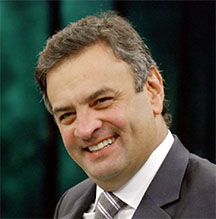BRASILIA (Reuters) – President Dilma Rousseff is heading into today’s presidential runoff vote with a slight lead in most polls over opposition candidate Aecio Neves, setting the stage for Brazil’s tightest election in decades.

A survey released yesterday by polling firm Ibope gave Rousseff a 6-percentage point lead over Neves, while a closely-watched poll by Datafolha showed the incumbent ahead by 4 points, within the survey’s margin of error.
Earlier in the day, however, a survey by smaller polling firm MDA showed Neves with a razor-thin lead of less than 1 percentage point, a dead heat given the poll’s margin of error.
Today’s election pits a pro-business senator who is promising to revive a stagnant economy against a Workers’ Party president who vows to expand popular social programmes that have lifted millions from poverty.

Rousseff has 53 per cent of the valid votes against 47 per cent for Neves, Ibope said, a narrower lead than in its previous poll on Thursday, which showed the incumbent with 54 per cent and the challenger with 46 per cent.
Datafolha also showed Rousseff’s lead has narrowed, giving her 52 per cent of valid votes versus 48 per cent for Neves. That compares with 53 per cent for the president and 47 per cent for Neves on Thurs-day. Both polls have a margin of error of plus or minus 2 percentage points.
The new polls were partly conducted after the final television debate on Friday night in which Neves accused Rousseff of running a corrupt government that should be voted out of office.
The earlier MDA poll showed Neves running neck and neck with Rousseff. Neves had 50.3 per cent of the valid votes against 49.7 per cent for Rousseff in that poll, which had a margin of error of 2.2 percentage points in either direction.
In a last attempt to sway some 10 per cent of undecided voters, the candidates traded accusations over political corruption on Friday night in the final television debate.
